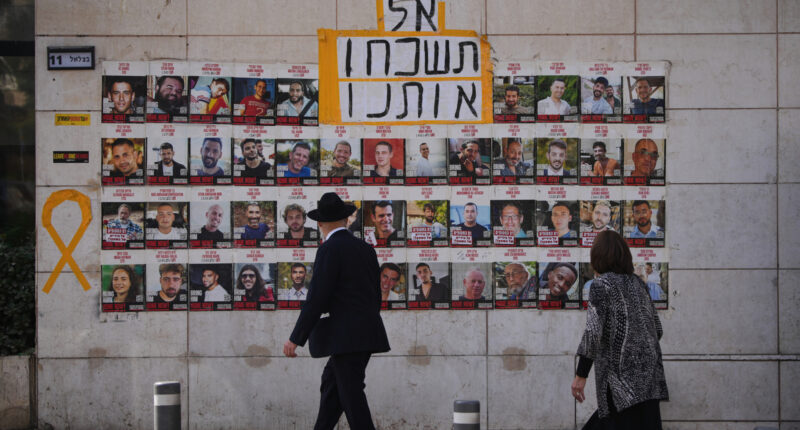Share this @internewscast.com
TEL AVIV, Israel — Israel’s army announced on Saturday that it would move forward with the initial stage of U.S. President Donald Trump’s plan to end the conflict in Gaza and secure the return of all remaining hostages.
The army revealed that Israeli leaders had instructed them to “advance readiness” to implement the plan. An official, speaking anonymously due to not being authorized for media interaction, stated that Israel has adopted a defensive stance in Gaza, refraining from active strikes, although no forces have been withdrawn from the area.
This declaration followed Trump’s directive to halt Israeli bombings in Gaza, following Hamas’s acceptance of certain aspects of his plan. Trump expressed optimism, stating: “I believe they are ready for a lasting PEACE.”
Trump seems determined to fulfill promises to conclude the war and secure the hostages’ release before the upcoming anniversary of the attack on Tuesday. Introduced earlier this week, his proposal has gained extensive international backing and received support from Israeli Prime Minister Benjamin Netanyahu.
On Friday, Netanyahu’s office expressed Israel’s commitment to ending the conflict, which began with Hamas’s attack on Oct. 7, 2023, while not addressing potential issues with the militant group. With mounting pressure from the global community and Trump, Netanyahu issued a rare late-night statement on the sabbath, announcing Israel’s preparations for Trump’s plan due to U.S. administration pressure, as relayed by an official.
The official also said that a negotiating team was getting ready to travel, but there was no date specified.
A senior Egyptian official disclosed ongoing discussions concerning the release of hostages and Palestinian prisoners held in Israeli detention. The official, engaged in ceasefire negotiations, noted that Arab mediators are facilitating comprehensive talks to consolidate the Palestinian stance on Gaza’s future.
On Saturday, the Palestinian Islamic Jihad, the second most powerful militant group in Gaza, said it accepted Hamas’ response to the Trump plan. The group had previously rejected the proposal days earlier.
Also on Saturday, Gaza’s Health Ministry said that the death toll in the nearly two-year Israel-Hamas war has topped 67,000 Palestinians. The death toll jumped after the ministry said it added more than 700 names to the list whose data had been verified.
Gaza’s Health Ministry does not say how many were civilians or combatants. It says women and children make up around half the dead. The ministry is part of the Hamas-run government, and the U.N. and many independent experts consider its figures to be the most reliable estimate of wartime casualties.
Progress, but uncertainty ahead
Yet, despite the momentum, a lot of questions remain.
Under the plan, Hamas would release the remaining 48 hostages – around 20 of them believed to be alive – within three days. It would also give up power and disarm.
In return, Israel would halt its offensive and withdraw from much of the territory, release hundreds of Palestinian prisoners and allow an influx of humanitarian aid and eventual reconstruction.
Hamas said it was willing to release the hostages and hand over power to other Palestinians, but that other aspects of the plan require further consultations among Palestinians. Its official statement also didn’t address the issue of Hamas demilitarizing, a key part of the deal.
Amir Avivi, a retired Israeli general and chairman of Israel’s Defense and Security Forum, said while Israel can afford to stop firing for a few days in Gaza so the hostages can be released, it will resume its offensive if Hamas doesn’t lay down its arms.
Others say that while Hamas suggests a willingness to negotiate, its position fundamentally remains unchanged.
This “yes, but” rhetoric “simply repackages old demands in softer language,” said Oded Ailam, a researcher at the Jerusalem Center for Security and Foreign Affairs. The gap between appearance and action is as wide as ever and the rhetorical shift serves more as a smoke screen than a signal of true movement toward resolution, he said.
Unclear what it means for Palestinians suffering in Gaza
The next steps are also unclear for Palestinians in Gaza who are trying to piece together what it means in real terms.
“What we want is practical implementation. … We want a truce on the ground,” said Samir Abdel-Hady, in Gaza’s Khan Younis. He worried that talks will break down like they’ve done in the past.
Israeli troops are still laying siege to Gaza City, which is the focus of its latest offensive. On Saturday Israel’s army warned Palestinians against trying to return to the city calling it a “dangerous combat zone”.
Experts determined that Gaza City had slid into famine shortly before Israel launched its major offensive there aimed at occupying it. An estimated 400,000 people have fled the city in recent weeks, but hundreds of thousands more have stayed behind.
Families of the hostages are also cautious about being hopeful.
There are concerns from all sides, said Yehuda Cohen, whose son Nimrod is held in Gaza. Hamas and Netanyahu could sabotage the deal or Trump could lose interest, he said. Still, he says, if it’s going to happen it will be because of Trump.
“We’re putting our trust in Trump, because he’s the only one who’s doing it. … And we want to see him with us until the last step,” he said.
___
Magdy reported from Cairo
Copyright © 2025 by The Associated Press. All Rights Reserved.

















